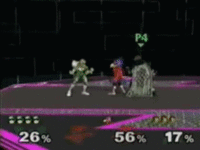Team wobble: Difference between revisions
| Line 24: | Line 24: | ||
There is a form of a team wobble that can be done with {{SSBU|King K. Rool}} and {{SSBU|Ridley}}. The wobble is done by having King K. Rool [[bury]]ing with his down throw, Ridley using the sweetspot of [[Skewer]], and then repeating. | There is a form of a team wobble that can be done with {{SSBU|King K. Rool}} and {{SSBU|Ridley}}. The wobble is done by having King K. Rool [[bury]]ing with his down throw, Ridley using the sweetspot of [[Skewer]], and then repeating. | ||
While not confirmed, Both {{SSBU|R.O.B}} and {{SSBU|Banjo & Kazooie}} could do team wobbles in a manner similar to King K Rool | While not confirmed, Both {{SSBU|R.O.B.}} and {{SSBU|Banjo & Kazooie}} could do team wobbles in a manner similar to King K Rool | ||
==External links== | ==External links== | ||
Revision as of 15:06, September 17, 2019
A team wobble, named after the wobble, is when two players on a team continuously grab a single opponent just as they escape from the other's grab or throw. Two players stand on each side of their target, with one grabbing and pummelling, the other waiting to catch the opponent when they manage to escape; they then trade duties and repeat. The team wobble can also be performed with throws by delivering low knockback; performing it with throws makes it impossible to escape out of using an air release and does not require prediction of the opponent's escape like the grab release version does. As long as both players grab correctly, this is a team infinite. Although all characters can perform this, those with fast and long grabs (such as Marth or Olimar) are better at team wobbles than those with slow or short grabs (such as Bowser or Pikachu).
Although difficult, it is possible to escape or at least disrupt a team wobble by forcing an air release via timely jump inputs. This technique can be performed with two players on a team, or two opposing players working together (although they must be sure not to get hit by each others' pummels). Because of stale-move negation, this strategy takes a large amount of time to build up notable damage, and is therefore mostly used for stalling the game, or annoying the target player.
It is one of the two advanced techniques that was in the first three Smash games but no longer possible after Smash 4, the other being chain grabing.
Team wobbling examples
In Super Smash Bros.
It is difficult to team wobble in Super Smash Bros., as pummels do not exist and grabs cannot be escaped without a throw. However, Donkey Kong is able to cargo release into another DK grabbing, and with correct timing, certain characters can regrab repeatedly by using a forward throw in place of a grab release, including Captain Falcon and Ness.
In Super Smash Bros. Melee
This technique is usually used at the end of doubles matches. Characters with quick grabs and pummels such as Fox, Ganondorf, and Marth are usually seen doing this. The beginning of the Wombo Combo, for example, involves Captain Falcon and Fox grab releasing another Fox.
In Super Smash Bros. Brawl
Team wobbling is much more common in Brawl as it is possible to grab release characters easily. However, the throwers must be careful to not unnecessarily tap and risk a trip. It is also possible to use King Dedede's chain grab to down throw into one another's grab.
In Super Smash Bros. 4
Due to characters being immune to grabs for at least a second after being grabbed, this technique cannot be performed in this game.
In Super Smash Bros. Ultimate
There is a form of a team wobble that can be done with King K. Rool and Ridley. The wobble is done by having King K. Rool burying with his down throw, Ridley using the sweetspot of Skewer, and then repeating.
While not confirmed, Both R.O.B. and Banjo & Kazooie could do team wobbles in a manner similar to King K Rool
